SEWA Bharat is a federation of women-led institutions providing economic and social support to women in the informal economy. SEWA Bharat is part of the national SEWA movement and was established in 1984. SEWA Bharat emerged out of the need to address the SEWA movement’s challenges with geographical expansion and coordination. SEWA Bharat is a family of SEWA organizations to further informal women workers’ rights, livelihoods, financial independence, education, health, and social security.
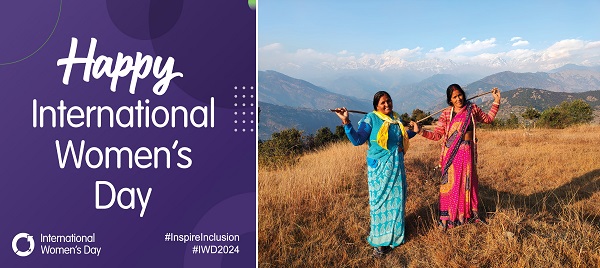

Meet Shivika Panwar, currently working as the Enterprise Development Associate and the driving force behind SEWA Bharat’s tourism initiatives. With a passion for empowering women in the informal economy, Shivika is currently spearheading initiatives across Almora and Rudraprayag to revolutionize the homestay industry. Her role involves strategizing and implementing digitally-driven marketing and sales plans, ensuring that women-owned homestay clusters thrive competitively while prioritizing the needs and skills of women micro-entrepreneurs.
Shivika’s mission goes beyond just boosting sales; she’s dedicated to building the capacity of homestay hosts and community-based support staff. Through comprehensive training in finances, hospitality, and business development, Shivika equips them with the tools they need to run their enterprises independently, paving the way for a brighter future for women in the tourism sector.
In commemoration of International Women’s Day 2024, Shivika Panwar, serving as the Enterprise Development Associate, engaged in an insightful discussion with the editorial team of Tourism India. Centered around this year’s theme and SEWA Bharati’s initiatives, their conversation delved deep into Shivika’s journey and perspectives amidst the scenic Himalayan foothills. Highlights from their dialogue provide enlightening insights into her socio-cultural experiences and professional endeavors..
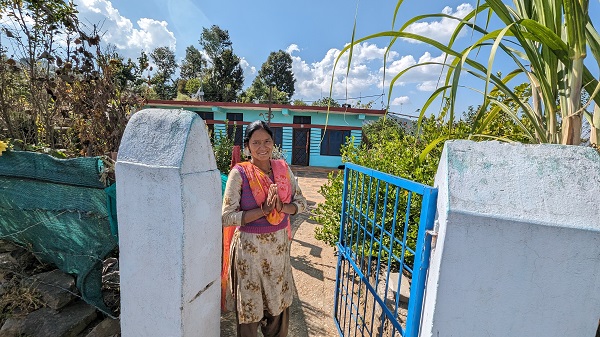

Can you provide an overview of SEWA Bharat’s mission and objectives, particularly about supporting women-run homestays in Uttarakhand?
SEWA (Self-employed Women’s Association) Bharat’s mission is to empower women in the informal economy holistically. SEWA Atithi is a collective of homestays nestled in the picturesque landscapes of Uttarakhand, where we envision a future of diversified livelihoods and reduced economic vulnerabilities for women. The goal is to foster an entrepreneurial mindset among the women of the collective and transform them into successful micro-entrepreneurs, who help with the development of rural tourism, and reduce their dependency on farm-based livelihood which is highly impacted due to climate change.
How does SEWA Bharat identify and select women who are interested in starting homestays in Uttarakhand?
SEWA Bharat collaborates with women of Uttarakhand who are primarily dependent on farmland. The prospect of cultivating a homestay collective within our member communities undergoes a thorough evaluation, hinging on the robustness of ties with community members, the desire of the women to run a homestay, the rural essence of the village, and the alignment of potential hosts with SEWA Atithi’s onboarding criteria. The eligibility criteria delve into the various aspects of the potential host’s home’s infrastructure, room ventilation, preferred guest type, and more. This comprehensive criteria ensures a holistic assessment, setting the stage for the creation of a successful homestay operation. We inform the women of the nature of operations in running a homestay, the financial investment it would take, the basic infrastructure that is needed in their houses, and the time it would take to do the homestay operations. It is then that we gauge the desire and willingness of the women to take this effort to be able to run their homestay.
SEWA Bharat works by organizing women workers in the informal economy for their rights and through this organizing, women are brought together for community meetings where they discuss these issues and the team gets to interact with women who might meet our above-mentioned criteria for eligibility. With these women, we proceed to fill out detailed questionnaires to further scrutinize their eligibility and readiness to embark on the enriching journey of SEWA Atithi homestays.
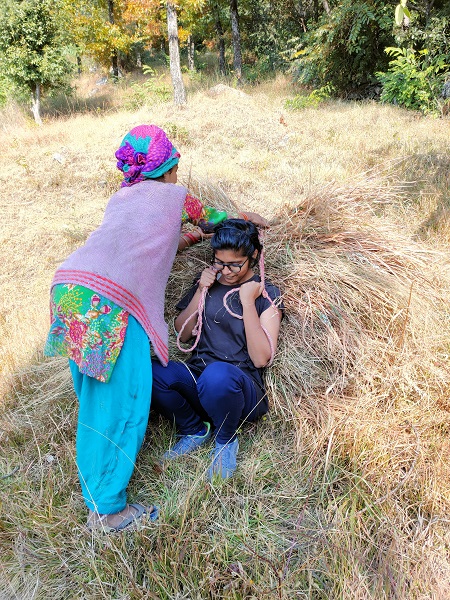

What kinds of support and resources does SEWA Bharat provide to women entrepreneurs running homestays, particularly in terms of training, marketing, and access to finance?
SEWA Bharat’s business support team, the Women’s Enterprise Support System (WESS) serves as a vital support system for the collective of homestays. Our efforts begin with aiding hosts in the necessary documentation for the Ministry of Tourism registration and ensuring a seamless renewal process for their Tourism certificates. SEWA diligently empowers homestay owners with comprehensive training in essential areas such as homestay operations, sanitation, maintenance, hospitality, culinary skills, and efficient invoicing and bookkeeping. We invest in the holistic development of our homestay owners, offering hands-on training in essential areas such as homestay operations, sanitation, maintenance, and the art of crafting unforgettable experiences. Our goal is to nurture their skills, and capacities, fostering independence and resilience.
We believe in fostering entrepreneurs who take ownership of their ventures. As part of this journey, they invest their capital, infusing their businesses with dedication and commitment. Simultaneously, we facilitate access to government schemes and financial institutions, ensuring a robust ecosystem for their growth.
Can you discuss the impact that SEWA Bharat has had on women’s economic empowerment and community development through its homestay initiatives?
The SEWA Atithi homestay collective was started as a pilot, arising out of the ask of our women members to help them find a sustainable alternative for their primary livelihood- agriculture. Due to climate change and its impact on agriculture- lesser rainfall and destruction of crops due to wildlife, it has become an incredibly low-yielding, high-effort occupation that offers little to no security for the farmers, who are primarily women in the state. This pilot is being run with the hope that rural tourism can help women earn more. As a homestay owner in the SEWA Atithi collective, women are now learning technology to use online platforms like booking.com, they are now learning to create invoices and are opening their homes to travelers and guests which in turn can expose them to so much more. SEWA Bharat not only educates women about their rights but also actively encourages them to assert those rights. Within the state, we connect our members to essential social security programs and empower them through comprehensive training in digital and financial literacy.
What are some of the challenges faced by women running homestays in Uttarakhand, and how does SEWA Bharat address these challenges?
The hospitality sector presents its own set of distinctive challenges, and when juxtaposed with the entrepreneurial hurdles faced by the women in the collective, a formidable array of obstacles emerges. In Uttarakhand, women managing homestays confront issues such as inadequate infrastructure, a lack of homestay business know-how, safety risks, business unpredictability, documentation gaps for homestay registration, and stiff competition from commercialized homestays.
SEWA Bharat takes steps to tackle these challenges head-on by working to enhance the skills of these women. We foster peer learning through exposure visits to similar initiatives in the hospitality space.
SEWA Bharat works with women by collectivizing them as there is strength in numbers and brings more visibility to them. This collective operates with specified rules for both hosts and guests, ensuring a secure and standardized environment. Addressing some concerns about hosting guests, SEWA Atithi allows hosts to choose the guests they feel comfortable with. For instance, homestay owners who live alone often opt to host families and females exclusively to ensure their comfort and safety. The SEWA Bharat team dedicatedly adheres to these pre-conditions. Moreover, hosts within the collective are encouraged to resolve conflicts with the mutual support of one another.
SEWA Bharat’s field staff (who are mostly women themselves) serve as invaluable companions for the women in their journey through government departments to get their documents. With a hands-on approach, they guide and support at every step of the application process, ensuring a seamless experience. Through guidance, support, and follow-ups, our team strives to facilitate the acquisition of essential documents, assisting to empower these women in navigating bureaucratic processes.
We are empowering their livelihood through a sustainable and practical approach tailored to their needs.
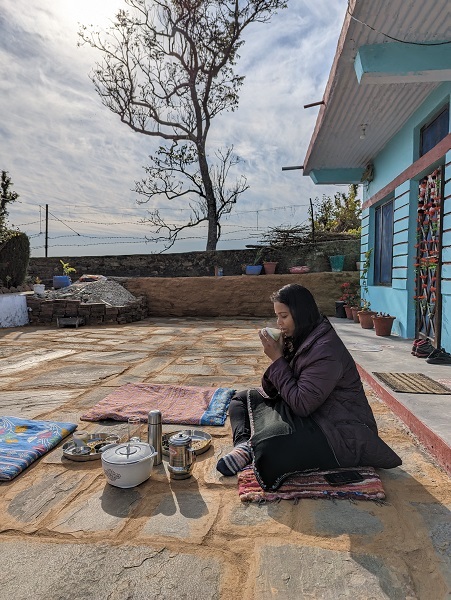

How does SEWA Bharat ensure that the homestays supported by the organization adhere to quality standards and offer authentic and meaningful experiences to guests?
Ensuring a consistent and high-quality operational standard within a collective spanning three villages is an ongoing commitment that requires constant effort. This includes onboarding an ‘Udyamiskahi’ from within the community to help the homestay owners in their operations, adhering to the eligibility criteria set for the collective when identifying the hosts, and following SOPs.
The Udyamisakhi supports the hosts with various aspects of homestay operations, including ensuring sanitation and preparation before guest arrival, responding to guest inquiries, creating invoices, and maintaining regular engagement to continually enhance the hosts’ capacity in homestay upkeep and management. SEWA Bharat also ensures that the hosts are trained regularly and are given refresher training to better their skills.
Onboarding women who primarily depend on farming for their livelihoods contributes to the creation of a distinctive and experiential rural atmosphere within the SEWA Atithi homestays.
Can you share any success stories or examples of women who have thrived as homestay owners with the support of SEWA Bharat?
The SEWA Atithi pilot empowers women entrepreneurs to independently run a sustainable livelihood model. Take the inspiring example of Meenakshiben and Nirmalaben, who transformed from household members to homestay owners. They embarked on a journey of learning and adaptation, embracing booking platforms, mastering social media marketing, engaging with guests, and refining the operational aspects of running a homestay. With newfound expertise and a deep understanding of the business, they confidently invested in enhancing their offering—constructing additional, better rooms and elevating the quality of their services. Independently navigating their way through the digital landscape, they have skillfully managed their homestay, culminating in sales of Rs. 53,040 since 2021 without accounting for the sales they made as part of the collective.
Their story does not end with their success; they remain integral to the collective, providing invaluable support and inspiration to fellow homestay owners. They epitomize the transformative power of independence and collective spirit, setting a benchmark for entrepreneurial success within the SEWA Atithi network.
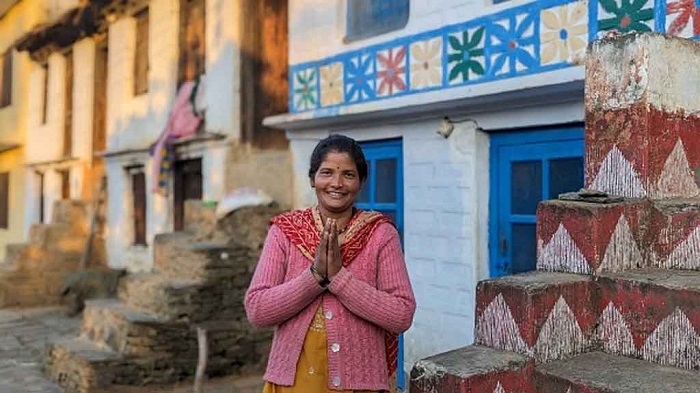

What role does community engagement play in SEWA Bharat’s approach to promoting women-run homestays in Uttarakhand?
Community engagement lies at the heart of SEWA Bharat’s work. We orchestrate our efforts through vibrant ‘Mohalla meetings,’ where women come together. These gatherings serve as the gateway to introducing homestays as an alternative livelihood. When we identify enthusiastic women as homestay owners, it is through these community connections.
As a rural homestay collective, our bond with the community is non-negotiable because what we provide extends beyond mere accommodation. It’s about immersing the entire community in our offerings—whether it’s strolling through picturesque villages, savoring cultural evenings, or experiencing authentic interactions with our guests.
How does SEWA Bharat collaborate with local governments, tourism boards, and other stakeholders to create an enabling environment for women entrepreneurs in the homestay sector?
SEWA Bharat thrives on the power of collaboration, recognizing that shared efforts amplify impact. In this spirit, we’ve forged meaningful partnerships with government functionaries like the District Tourism Development Board and the Rural Business Incubator and private entities like the Himlayank Ark, fostering an exchange of knowledge and experiences. One of our homestay collectives in katarmal, Almora was started at the request of the District Magistrate in Almora to help in their efforts to develop the village.
As the SEWA Atithi homestay collective took shape, we prioritized immersive learning experiences for our hosts. An enlightening exposure trip to the Himalayan Ark in Munsyari became a pivotal moment. Here, our hosts not only absorbed insights from Ms. Mallika Virdi but also engaged with the hosts within their collective, enriching their understanding of homestay operations.
To deepen our reservoir of experiential knowledge, SEWA Bharat extended its collaborative network to include Ms. Manisha Pande, CEO of Village Ways, and her team. This connection became a valuable source of peer learning and guidance, enriching our approach to homestay initiatives.
Through these diverse collaborations, SEWA Bharat creates a dynamic ecosystem that propels the SEWA Atithi homestay collective towards excellence and sustainable impact.
Looking ahead, what are SEWA Bharat’s goals and plans for expanding its support to women-run homestays in Uttarakhand and beyond?
We are presently working with a group of 7-8 women, and our community will organically expand as the need or interest in the SEWA membership emerges.
In what ways do you believe investing in women within the tourism industry can accelerate progress?
In the hills of Uttarakhand, women constitute a significant portion of the local population. This phenomenon arises from the migration of most men out of the state. By directing investments toward women within the tourism industry, we also enhance the well-being of their communities, boost the economy, and strengthen households. Women serve as the most influential catalysts for development.
How do you prioritize diversity and inclusion within your tourism ventures, particularly concerning gender equality?
SEWA exclusively supports women from the informal economy, ensuring that our inclusivity is inherent and unwavering.
What opportunities do you see for women in leadership roles within the tourism sector, and how can they be encouraged and supported?
Women workers who run rural homestays can advocate for better policies basis their experience and needs, they can be the voice of the rural tourism sector and help the government create a more inclusive and enabling environment for the growth and development of Uttarakhand’s rural tourism sector.
Also Read
Kerala to tap beach tourism potential
Watch on Youtube
